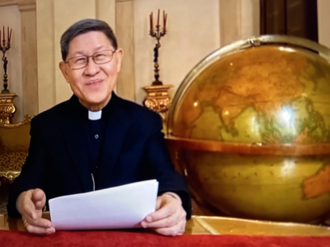Cardinal Tagle's message to conference on centenary of Shanghai Council

Cardinal Tagle - ICN Screenshot
Source: Fides
Cardinal Luis Tagle, Prefect of the Dicastery for Evangelization, has sent a video message to the international conference "Primum Concilium Sinense (Shanghai Council): History and Significance" organized by the University of Saint Joseph in Macao from 26 to 29 June on the centenary of the First Council of the Catholic Church in China (1924-2024).
Watch Cardinal Tagle's address here: www.youtube.com/watch?v=QycGMmL746c&t=11s
The full text of his address follows:
Dear brothers and sisters,
In the name of the Dicastery for Evangelisation, the Section for First Evangelisation and Young particular churches, I send greetings to each one of you from the Palace of Propaganda Fide in Rome, as you come together for days of study, dialogue and discernment centered on an ecclesial event that took place one hundred years ago: the First Council of the Catholic Church in China (Primum Concilium Sinense), which was held in Shanghai from May 15 to June 12, 1924.
The Shanghai Council was a turning point in the journey of the Catholic Church in China. The concerns it addressed and the responses it gave are, in many ways, still relevant today. Allow me to share four points.
1) The Shanghai Council can be considered a new beginning, a fresh start, in the sense of bringing us back to the authentic source and the true nature of the Church's apostolic work and overcoming the misunderstanding that seemed to prevail during the period of Colonialism. This misconception, that was present even in China, tended to identify Christianity as a religious doctrine imposed by other civilizations, with instruments of political, social or cultural pressure. This misunderstanding became an obstacle to the proclamation of the Gospel, and often fueled distrust, hostility and even hatred toward the Church and missionaries.
The Shanghai Council followed the directions contained in the Apostolic Letter Maximum Illud in which Pope Benedict XV reiterated that faith in Christ "is foreign to no nation". For the liberation and healing brought by Jesus is a gift for everyone and for all, as Pope Francis always repeats. The Shanghai Council shows how the mission of proclaiming the Gospel is not identified with one civilization and one culture, and precisely because of this it protects and promotes the riches of individual peoples and their cultures. Thus documents of the Shanghai Council contain reminders to openness to the values of Chinese culture and society.
We are living in a time of global opposition, with some sectors fueling the so-called "Clash of Civilizations." The Shanghai Council indicated another way: the possibility that cultural traditions are not closed in on themselves, not opposed to one another, but remain open to mutual encounter and exchange.
2) When the Shanghai Council took place, the bishops present in China were all missionaries who had come from other countries. The Council laid the foundation for a fully Chinese Catholic Church to flourish, led by Chinese bishops. And even this direction was not driven by human tactics or calculations, but by the mystery of the Church in its pilgrimage of the world.
The fruit of the proclamation of the Gospel and of any authentic apostolic mission is always the birth of a local Church, fully immersed in its historical, social and cultural context. But this immersion, this immanence of the Church in the different contexts never makes the local Church an isolated, self-sufficient reality closed in on itself. Each local Church is always in communion with the other local Churches and with the whole universal Church.
3) The Shanghai Council also represents a realization of synodality, which is being re-proposed so powerfully to us in our time as well, thanks to the magisterium of Pope Francis.
The Apostolic Delegate Celso Costantini, who presided over the Council at the behest of Pope Pius XI, compared the Shanghai Synodal Assembly to the Council of Nicaea, where "those who were far apart saw themselves gathered together."
Even at the Shanghai Council, the Fathers who participated in the Council experienced that synodality is not a secondary, but a constitutive and indispensable dimension of the Church's life.
Pope Francis, in the Video Message sent to the Conference on the Concilium Sinense organized in Rome on May 21 by the Pontifical Urbanian University in collaboration with Fides News Agency, said the participants in that Council "lived an authentically synodal experience and made important decisions together. The Holy Spirit brought them together, made harmony grow among them, led them along paths that many among them would not have imagined, overcoming even perplexity and resistance. So does the Holy Spirit who guides the Church." Pope Francis addressed the participants at that conference, among whom was also the Bishop of Shanghai, Joseph Shen Bin.
4) Let me also pay tribute to Cardinal Celso Costantini, who as the first Apostolic Delegate to China was on a human level the great director of the Shanghai Council.
Costantini, moving in the footsteps of Matteo Ricci, implemented Maximum Illud. We can learn much from this prophetic and creative figure. Pope Francis, in his video message to the Conference on the Council of Shanghai held at the Pontifical Urbaniana University, emphasized that "In the Council of Shanghai, also thanks to the work of Celso Costantini, the communion between the Holy See and the Church that is in China manifested itself in its fruitful fruits, fruits of good for all the Chinese people."
I pray that, in the light of the Primum Concilium Sinense, you may see more clearly the paths on which we can travel together with our Chinese brothers and sisters, so that in our common witness to our faith in Jesus Christ, "fruits of good for all the Chinese people" may grow. May God bless you!


















